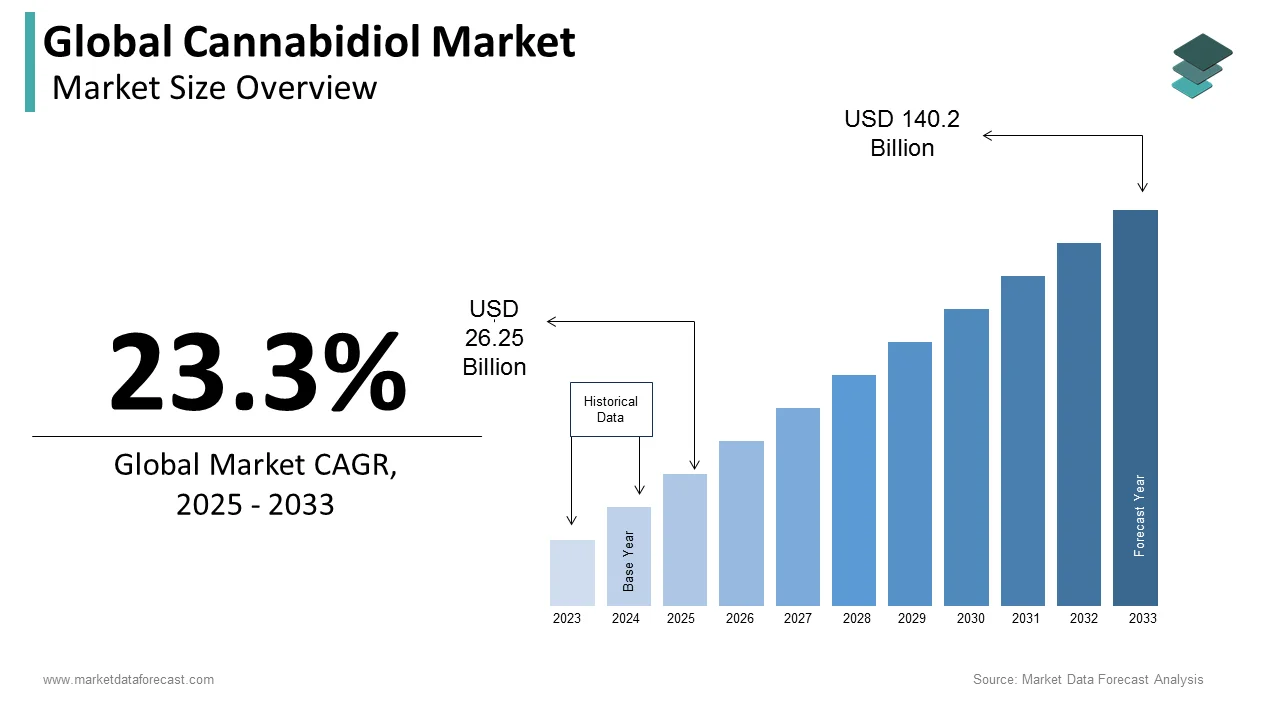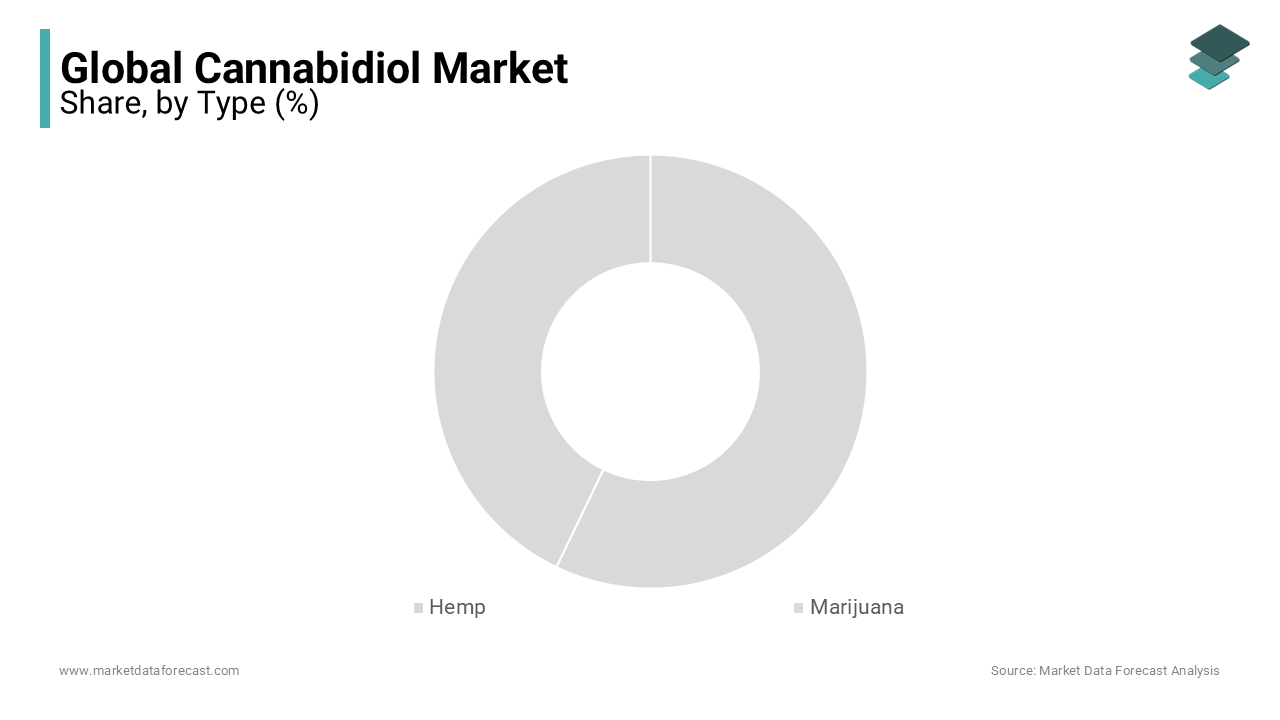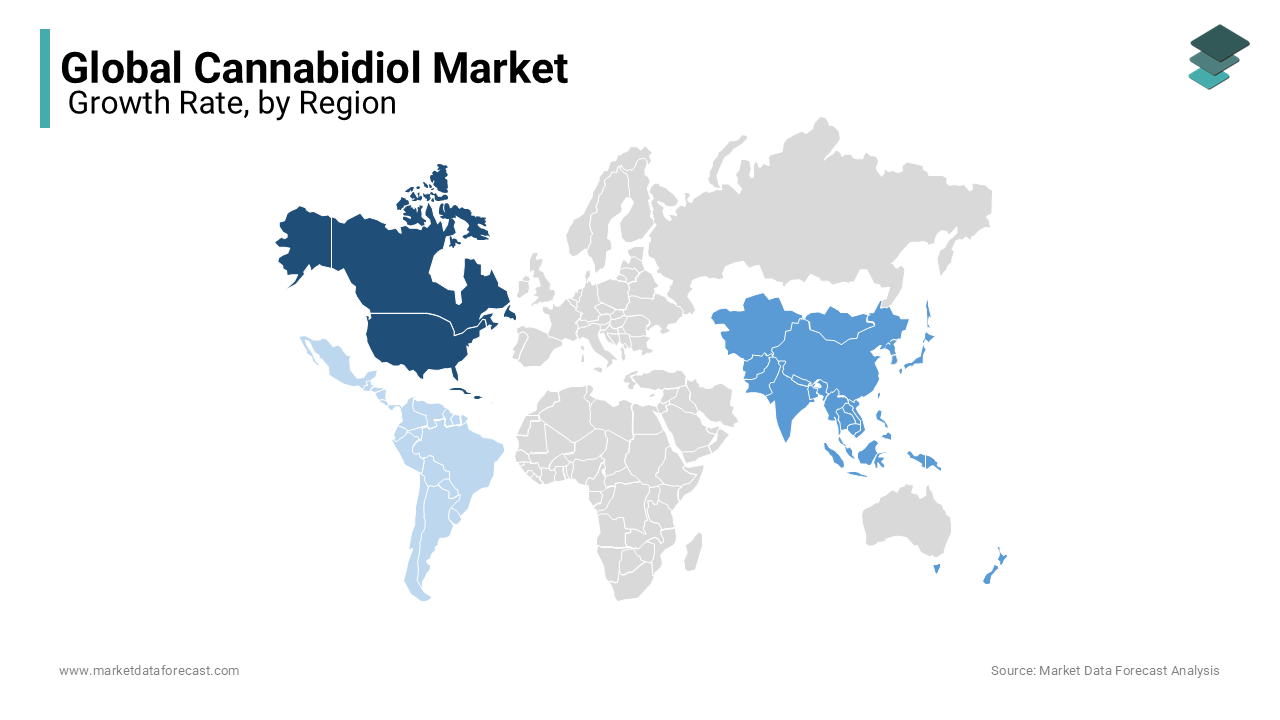Global Cannabidiol Market Size, Share, Trends & Growth Forecast Report By Type (Hemp and Marijuana), Distribution Channel (B2B and B2C), End-User (Medical, Personal Use, Pharmaceuticals and Wellness) and Region (North America, Europe, Asia-Pacific, Latin America, Middle East and Africa), Industry Analysis (2025 to 2033)
Global Cannabidiol Market Size
The global cannabidiol market was valued at USD 21.29 billion in 2024 and is expected to expand at a compound annual growth rate (CAGR) of 23.3% from 2025 to 2033 and be worth USD 140.2 billion by 2033 from USD 26.25 billion in 2025.

The cannabidiol market has been becoming increasingly popular in the last few years because of its diverse potential health gains. Although mainly recognized for its therapeutic properties in handling inflammation, pain (neuropathic), anxiety, psychosis, and epileptic seizures. CBD’s effect on brain function has also captured the attention of experts and people attempting to improve cognitive performance. Moreover, currently, CBD products continue to be mostly unregulated. Also, it is essential to deal with the ethical worries related to their application, along with safety, consistency, and product quality.
MARKET DRIVERS
Growing Awareness of Wellness and Health Benefits of Cannabidiol
The application of products based on CBD is gradually rising, particularly in countries that have flexible rules for cannabis-derived products. In several nations, the acceptance of CBD items in medical treatments has surged in the last few years. Additionally, the pharmaceutical industry's significant interest in promoting different products in the production process is anticipated to elevate the market growth rate. Furthermore, the rising adoption of cannabidiol for skin care is another factor propelling its demand.
Increased adoption of products for CBD skincare acts as a demand catalyst.
The antioxidant properties of CBD can fight the signs of aging in the geriatric population, which is one of the major factors promoting the adoption of CBD in the cosmetic industry and driving market growth. In addition, the growing investments in R&D and increasing demand for skincare products are propelling the market’s growth rate. Therefore, in the years to come, the CBD skincare market is anticipated to grow significantly, which is expected to result in the growth of the cannabidiol market.
Growing usage of Cannabidiol (CBD) in Medical Applications, Supplements & Beverages
The usage of cannabidiol in medical applications has been growing continuously over the past few years. According to WHO, Epidiolex® is a liquid oral formulation of pure CBD derived from plants. GW Pharmaceuticals in the United Kingdom produces it. It has shown positive results in Phase 3 trials of Dravet and Lennox-Gastaut syndromes, which are treatment-resistant seizure disorders. In multiple countries, the adoption of cannabis-related products in medical treatments has spiked in recent years. The demand for cannabidiol (CBD) for medical and wellness purposes is gaining attention owing to its associated healing properties, which are now one of the primary drivers of the global cannabidiol market growth.
Growing Prevalence of Chronic Diseases
According to the World Health Organization (WHO), 2.5% of the global population, around 147 million people, consumes marijuana in different forms annually. This is eventually propelling the demand for CBD oil. In 2018, the National Center for Biotechnology Information (NCBI) stated that 62% of the population uses CBD oil to treat various health disorders. Increasing complications from cancer and other chronic diseases boost the market's demand. In addition, rising research and development activities in the healthcare sector are propelling the growth rate of the Cannabidiol market. Growing investments in research activities by government and non-government organizations are ascribed to boosting the market demand. CBD oil contains a poor concentration of tetrahydrocannabinol (THC), so there is abundant oil usage for medical purposes. Creating awareness of the use of cannabis appropriately is also leveraging the growth rate of the CBD oil market.
MARKET RESTRAINTS
Most of the developed regions have a high demand for cannabidiol-based products. Still, there is a need for awareness among people from developing and underdeveloped regions, especially Asia Pacific, Middle East, and Africa, regarding the benefits and functions expected to limit the market share expansion. Various side effects associated with cannabidiol products, such as diarrhea, changes in appetite, tiredness, drowsiness, and adverse effects on male fertility, are expected to hamper the market growth due to limited adoption by the people. The popularity of the product as a drug among the people as it is misused for recreational activities will impact negatively on the market growth rate. The presence of stringent regulations by the regulatory authorities for the approval of cannabidiol products will challenge the manufacturers due to complexity. The availability of other alternatives that provide functions similar to cannabidiol and fluctuations in raw material prices may impede the market growth rate during the forecast period.
Its low bioavailability is one of the challenges related to CBD administration, which is hindering the development of the cannabidiol market. This restriction requires the exploration of several processes to improve the bioavailability of CBD, therefore assisting to optimise its therapeutic abilities. Moreover, the existence of strict laws by the regulatory agencies for permission for these products is also a problem for producers because of complications.
REPORT COVERAGE
|
REPORT METRIC |
DETAILS |
|
Market Size Available |
2024 to 2033 |
|
Base Year |
2024 |
|
Forecast Period |
2025 to 2033 |
|
Segments Covered |
Based on Type, Distribution Channel, End-Users, and Region |
|
Various Analyses Covered |
Global, Regional and Country Level Analysis, Segment-Level Analysis, Drivers, Restraints, Opportunities, Challenges; PESTLE Analysis; Porter's Five Forces Analysis, Competitive Landscape, Analyst Overview of Investment Opportunities |
|
Regions Covered |
North America, Europe, Asia Pacific, Latin America, Middle East & Africa |
|
Market Leaders Profiled |
Pharmahemp d.o.o, ENDOCA, NuLeaf Naturals LLC, Folium Biosciences, Elixinol, Cannoid LLC, Medical Marijuana Inc., and Isodiol International Inc. |
SEGMENTAL ANALYSIS
By Type Insights
The hemp segment led the cannabidiol market in 2024 and is expected to hold the major share of the global market during the forecast period owing to the rising crop cultivation according to climatic conditions. In addition, legalizing the growing industrial hemp crop is also likely to fuel the market's growth rate.

On the other hand, the marijuana segment is anticipated to account for a healthy share of the cannabidiol market during the forecast period owing to the growing awareness of the use of marijuana in medical conditions. In addition, growing support from government authorities for effective drugs for treating various health conditions further promotes the segment’s growth.
The hemp segment is commanding the cannabidiol market and is projected to capture a significant portion during the forecast period. The surging application of hemp in food and beverage, especially for its oil and seeds, drives the segment’s market share. In addition, there is a growing inclination toward hemp as a sustainable substitute for conventional crops, as it needs less pesticides and water to cultivate.
By Distribution Channel Insights
The B2C distribution channel has been substantially growing over the past few years. The hospital pharmacies sub-segment registered a leading share of the market in 2024. The increasing scale of hospitals, the rising patient count, and the government's launch of new reimbursement policies favor the segment's growth rate.
The B2C segment is the prevailing distribution channel in recent years. Under this segment, the hospital pharmacies sub-segment gained the maximum market share. The rising number of hospitals, the increasing patient count, and the government’s introduction of new compensation policies fuel the segment’s market size.
By End-User Insights
The medical segment held the highest share of the cannabidiol market in 2024. Rising investments in manufacturing new drugs in favor of the end-users by public and private organizations are elevating the market's growth rate. In addition, mental disorders and chronic pain are increasing among people, gearing up the market's growth.
The medical segment is dominating in this category of the cannabidiol market. Several nations, in the last few years, have decriminalized and legalized marijuana for therapeutic purposes, like Japan. In addition, the increased number of research projects aiming to identify its potential abilities also contributes to the segment’s market share.
REGIONAL ANALYSIS
Geographically, North America is one of the developing markets for cannabidiol and is expected to expand further during the forecast period. CBD is primarily utilized to enhance health and mitigate symptoms of various diseases. According to research, the predominance of CBD as a therapeutic item worldwide is not broadly available. The application of Cannabidiol-derived products as a therapeutic medication is significant in Canada and the United States, with 16.2 percent and 26.1 percent, respectively. However, it is notably less popular in Europe, with an incidence between 14 percent and 10.9 percent.

Asia Pacific is another major cannabidiol market, with Japan, China, Thailand, and the Philippines in the lead. The escalating sales of products utilizing CBD are contributing to its increasing demand, which provides stress relief, sleep, and relaxation. Moreover, Japan’s favorable approach is one of the current trends in the regional market.
The Latin America cannabidiol market is forecasted to grow at a CAGR of 20.2% during the forecast period. Many Latin American governments are finally taking steps to create legal markets for cannabis and CBD products, but business opportunities for domestic retail sales are still limited. Thus, it adds further difficulty in approving imports and completing the shipping process to Latin America on time.
KEY MARKET PLAYERS
The global cannabidiol market is concentrated with well-established players like Pharmahemp d.o.o, ENDOCA, NuLeaf Naturals LLC, Folium Biosciences, Elixinol, Cannoid LLC, Medical Marijuana Inc., and Isodiol International Inc. ENDOCA substantially shared the Cannabidiol market in terms of sales and revenue in 2019.
RECENT HAPPENINGS IN THIS MARKET
- In September 2024, it was reported that a groundbreaking study examining the impact of cannabidiol (CBD) psychosis is planned to be introduced in late 2024. It is spearheaded by Oxford University and managed by the Prince of Wales International Centre for SANE Research. This will include one thousand patients and be conducted in 35 centers throughout North America and Europe.
- In August 2024, Vectura Fertin Pharma, Inc. and Aurora Cannabis Inc. reported that they have signed a commercial partnership with Cogent International Manufacturing Ltd., which is a fully owned subsidiary of Vectura Fertin Pharma.
MARKET SEGMENTATION
This research report on the global cannabidiol market has been segmented and sub-segmented based on the type, distribution channel, end-users, and region.
By Type
- Hemp
- Marijuana
By Distribution Channel
- B2B
- B2C
- Hospital Pharmacies
- Online
- Retail Stores
By End Users
- Medical
- Chronic Pain
- Mental Disorders
- Cancer
- Others
- Personal Use
- Pharmaceuticals
- Wellness
- Food & Beverages
- Personal Care & Cosmetics
- Nutraceuticals
- Others
By Region
- North America
- Europe
- Asia Pacific
- Latin America
- The Middle East and Africa
Frequently Asked Questions
How big is the global CBD market?
As per our research report, the global cannabidiol (CBD) market is estimated to value USD 140.2 bn by 2033.
What is the CBD market worth today?
The global cannabidiol market size is estimated to be USD 21.29 billion in 2024.
What is expected growth rate for cannabidiol market?
The global cannabidiol (CBD) market is expected to grow at a CAGR of 23.3% during the forecast period.
which region accounted for the largest share in the global cannabidiol market in 2024?
Geographically, the North American regional market led the global cannabidiol market in 2024.
Related Reports
Access the study in MULTIPLE FORMATS
Purchase options starting from $ 2500
Didn’t find what you’re looking for?
TALK TO OUR ANALYST TEAM
Need something within your budget?
NO WORRIES! WE GOT YOU COVERED!
Call us on: +1 888 702 9696 (U.S Toll Free)
Write to us: sales@marketdataforecast.com
